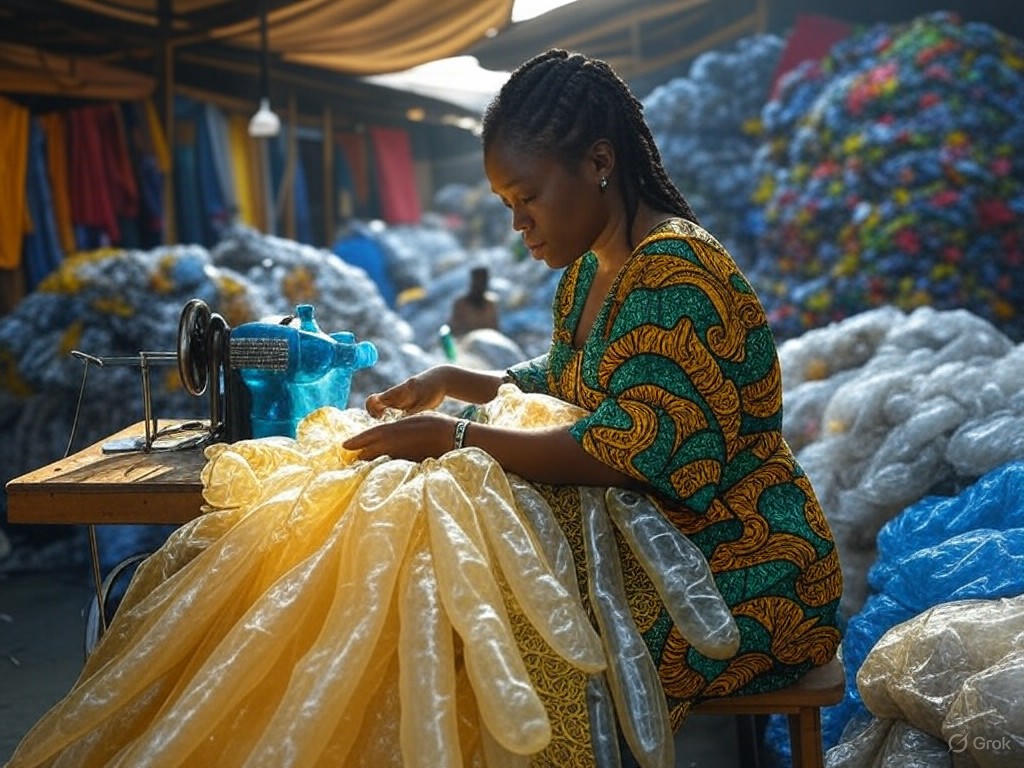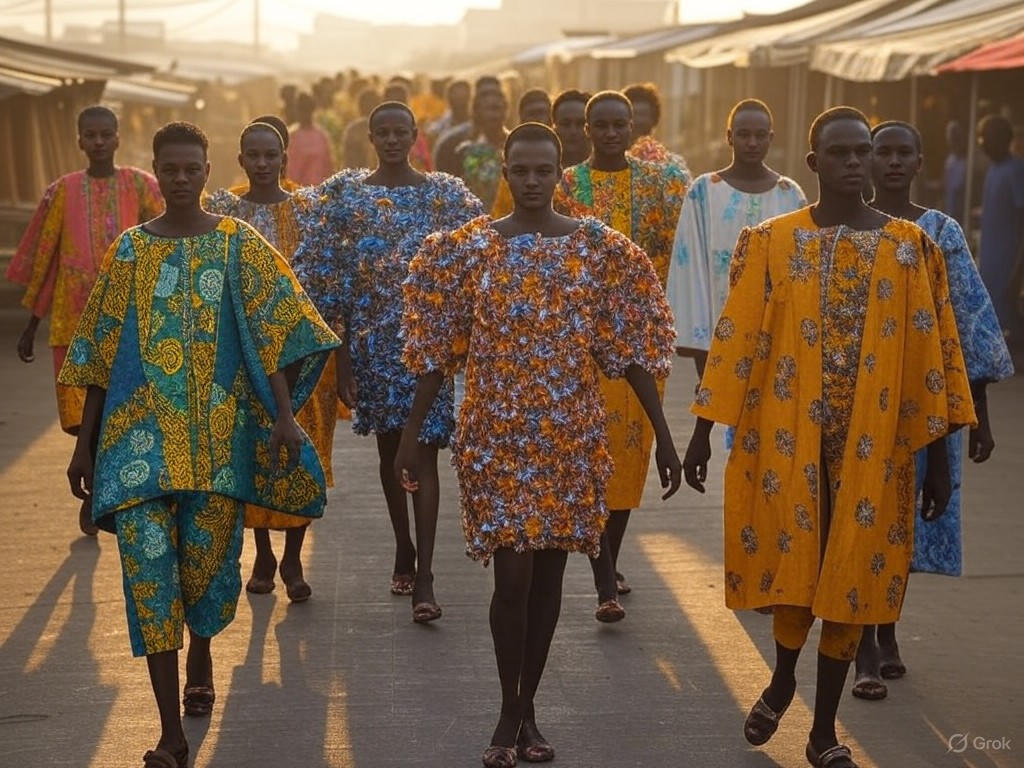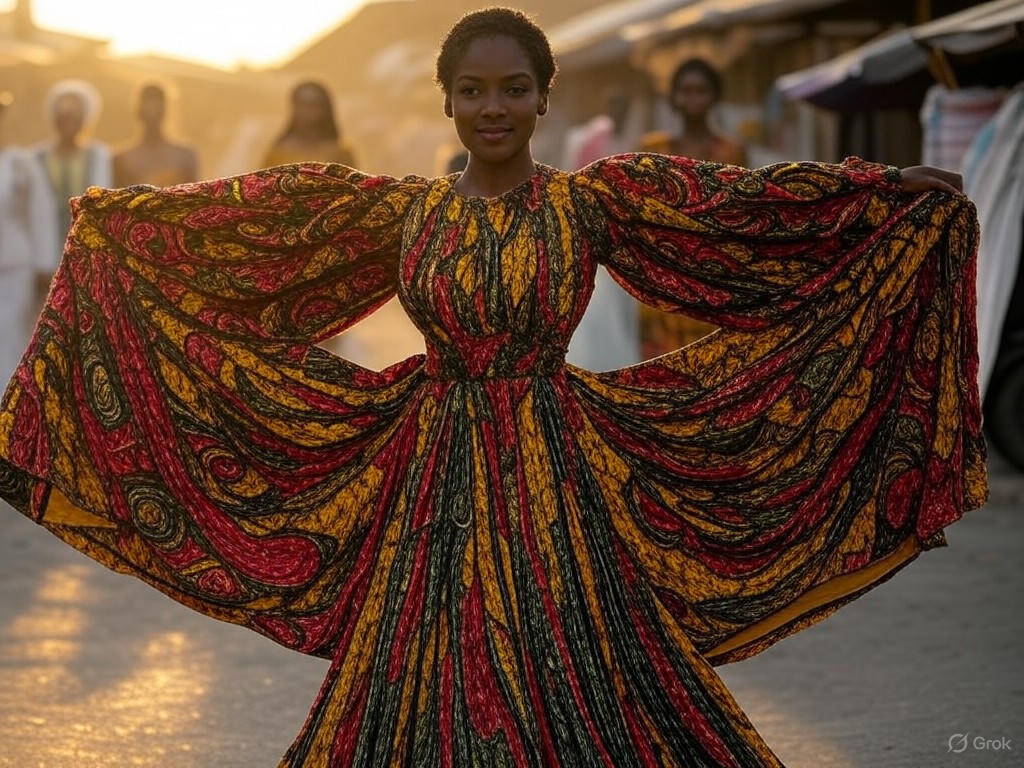Upcycled Fashion in Nigeria: Creative Reuse
In the bustling markets of Lagos, where the air hums with the rhythm of commerce and creativity, a quiet revolution is unfolding. Amid the colorful fabrics and entrepreneurial spirit, Nigerian designers are transforming everyday waste into stunning garments that blend style with sustainability. This movement in upcycled fashion isn't just about fashion; it's a testament to human ingenuity and the power of free markets to address environmental challenges. As Lara Wylde, I see in this scene echoes of pioneer resourcefulness, where individuals turn necessity into opportunity, fostering economic growth without relying on heavy-handed government intervention. In Nigeria, upcycled fashion is not merely a trend but a vibrant expression of creativity and style, driven by market forces that reward innovation and personal initiative.
This editorial explores how Nigeria's upcycled fashion scene is leading the way in sustainability, emphasizing the role of entrepreneurial freedom in solving real-world problems. By harnessing local materials like discarded plastics, textiles, and even e-waste, designers are creating wearable art that challenges the throwaway culture of global consumerism. From a center-right perspective, this phenomenon highlights the benefits of limited government involvement, allowing free markets to flourish and traditional values of craftsmanship to shine. Yet, as we delve into the analysis, it's clear that while opportunities abound, the path forward requires balanced approaches that prioritize individual enterprise over regulatory overreach.
The Rise of Upcycled Fashion in Nigeria
Nigeria's fashion landscape has long been a canvas for creativity, drawing from the country's rich cultural tapestry and resilient spirit. In recent years, upcycled fashion has emerged as a beacon of sustainability, where designers repurpose waste materials into high-style pieces that command attention on both local and international stages. Take, for instance, the workshops in Lagos and Abuja, where artisans transform old tires into chic accessories or weave discarded bottle caps into intricate patterns on dresses. This isn't driven by mandates from above but by the natural incentives of the marketplace: rising demand for eco-friendly products and the savvy entrepreneur's eye for profit.
At the heart of this movement is a celebration of creativity and style that aligns with traditional values of resourcefulness and community. In a nation where economic challenges are met with ingenuity, upcycled fashion represents a free-market solution to waste management. Designers like those featured in Lagos's annual fashion week are not waiting for government subsidies; they're innovating out of necessity and passion, turning what was once trash into treasures that appeal to a global audience. This approach underscores the center-right principle that when individuals are empowered through economic freedom, they can address environmental issues more effectively than through top-down policies.
Yet, the growth of upcycled fashion in Nigeria isn't without its hurdles. The global fashion industry, valued at over $2.5 trillion annually, often prioritizes cheap production over sustainability, leading to massive waste Wall Street Journal - "The Hidden Cost of Fast Fashion". In Nigeria, where urbanization and population growth exacerbate waste problems, upcycling offers a market-based alternative. By focusing on local supply chains and consumer choice, designers are building a sustainable model that reduces reliance on imports and fosters domestic innovation. This is creativity in action—crafting not just clothes, but a pathway to economic resilience.

A Lagos-based designer meticulously assembles an upcycled dress from recycled plastic bottles, showcasing the blend of traditional craftsmanship and modern sustainability in Nigeria's fashion scene.
Analysis: Free Markets and the Path to Sustainability
To understand the impact of Nigeria's upcycled fashion, we must examine how free-market dynamics are accelerating sustainability. Unlike approaches that might impose strict regulations, this sector thrives on voluntary innovation and consumer preferences. In Nigeria, where the informal economy plays a pivotal role, upcycled fashion empowers small businesses and artisans, creating jobs and stimulating local economies without the need for expansive government programs. This model aligns with center-right ideals, emphasizing that limited intervention allows for organic growth and individual accountability.
Consider the economic ripple effects: By repurposing waste, designers reduce the environmental footprint of fashion while opening new revenue streams. A study from a leading industry blog highlights that upcycled products can cut production costs by up to 40% and appeal to eco-conscious consumers Fashion Revolution - "Upcycling as Economic Innovation in Africa". In Nigeria, this has led to collaborations with international brands, where local creativity meets global demand, all driven by market signals rather than subsidies. Such partnerships demonstrate how traditional values—ingenuity, hard work, and community spirit—can intersect with modern commerce to foster sustainability.
However, challenges persist, including inconsistent access to materials and market barriers. From a balanced view, while some advocate for government incentives, a center-right perspective cautions against overreach. Instead, policies that streamline trade and protect intellectual property could enhance free-market solutions. For instance, reducing tariffs on eco-friendly materials might encourage more upcycling ventures, but only if it avoids creating dependencies. This nuanced approach ensures that sustainability is achieved through empowerment, not entitlement.

Models strut down a Lagos runway in outfits made from upcycled waste, illustrating the vibrant style and creativity that are redefining Nigerian fashion.
Evidence of Innovation and Forward Momentum
The evidence supporting Nigeria's upcycled fashion scene is compelling and rooted in real-world successes. Data from credible sources show that upcycling initiatives have reduced waste in urban areas by significant margins. According to a report from the World Bank, Africa's fashion sector could generate $5 billion in value through sustainable practices by 2030, with Nigeria at the forefront World Bank - "Sustainable Fashion in Emerging Markets". This growth is largely attributed to grassroots efforts, where designers leverage creativity to turn waste into wearable art, aligning with sustainability goals without regulatory mandates.
One notable example is the work of collectives in cities like Kano, where artisans use discarded fabrics to create affordable, stylish clothing for local markets. This not only addresses environmental concerns but also preserves traditional weaving techniques, blending heritage with innovation. As Vogue Business - "Nigeria's Upcycled Fashion Boom" reports, these efforts have led to a 25% increase in exports of handmade goods, driven by consumer demand for authentic, eco-friendly products. Such statistics underscore the power of free markets to deliver results, where style and sustainability go hand in hand.
Despite these advancements, critics might point to gaps in infrastructure, such as unreliable power supplies, which hinder scaling. Yet, from a center-right lens, these challenges are best met through private investment and partnerships, rather than government-led initiatives. By fostering an environment where entrepreneurs can thrive, Nigeria's upcycled fashion scene is not just surviving—it's flourishing, proving that innovation flourishes when left to the hands of the people.
Conclusion: A Vision of Sustainable Prosperity
As we look to the future, Nigeria's upcycled fashion movement offers an optimistic blueprint for global sustainability. Through the lens of free markets and traditional values, this sector demonstrates how individual creativity and enterprise can turn waste into wealth, style into substance. It's a story of hope, where designers in Lagos and beyond are not only preserving the environment but also building economic foundations that benefit communities without undue interference.
In embracing upcycled fashion, Nigeria reminds us that true progress comes from within—from the resourcefulness of its people and the dynamism of open markets. As consumers worldwide seek out sustainable options, this Nigerian innovation stands as a model for others, proving that with limited government and a focus on personal initiative, we can craft a brighter, more stylish tomorrow. Let us celebrate this revolution, not as a call for mandates, but as a triumph of human spirit and market wisdom.

